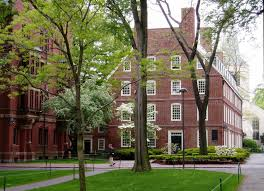
Last year, I left my job as a Finance Consultant at KPMG and started my MBA program at Harvard Business School (HBS). I’ve since finished my first year and am currently working at a startup for my summer internship while trying to figure out what the next few years will hold. It’s been an incredible journey so far and I’ve received a lot of requests to share my experience so I put this post together to help anyone interested in getting a glimpse of what life as a Harvard MBA student looks like.
Setting the stage
Before I dive into the post, I’d like to explain one concept: the Section. The section is a group of ~90 students (~72 for my year since we had more deferrals due to COVID) recognized as a unit by the administration. Throughout the first year, section-mates take all classes together, and generally develop a bond that continues even after graduation. They may be called cohorts or houses in other schools. There are usually 10 sections per year.
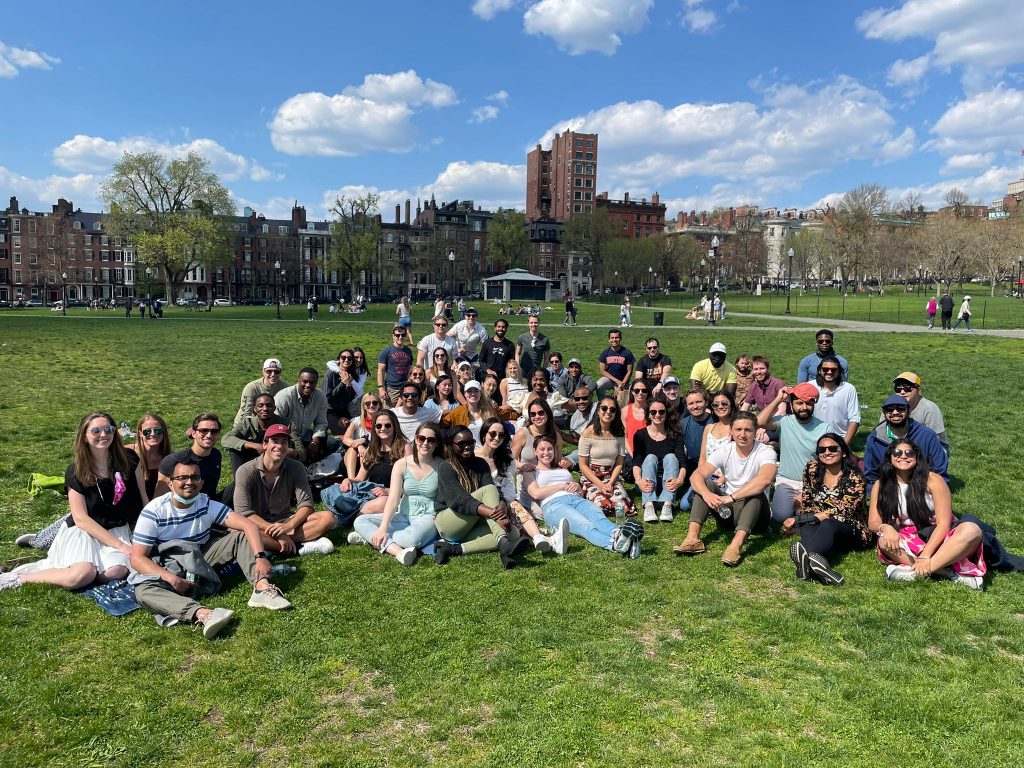
My first year started out with – you guessed it – START week. This is a week-long event that introduces new students to the key elements of life at HBS. It began with Section reveal, where I got to find out which section I was assigned to and to meet my section mates. After that, we had a series of events including talks from the administration, class simulations, sample cases and chats with second year students to give us a taste of what the next 2 years would look like.
Another thing to mention is that my class started in quite unprecedented circumstances (thanks to dearest COVID) and so some of our experiences are slightly different from the traditional HBS experience. That said, a lot of effort was put in by both the school and the students to make our year as close to normal as possible, and I will do my best to mention things that happen in a normal year that we may have missed out on.
I’ll be splitting this post along the three major aspects of the MBA experience: Academics, Careers and Student life. So, here we go:
Academics
The interesting thing about Business School is that people come here with different goals – some to network, some to career-switch, some just to take a break – and so even at a school like Harvard, not everyone prioritizes academics. Despite this, the standard is still high, so you do have to make an effort not to end up at the bottom of the class.
- Grading structure
HBS operates a “forced curve”, which means that your performance is assessed on a relative scale, not an absolute one. In contrast, most universities use an absolute scale where there are certain grade thresholds established, and everyone that scores above those thresholds gets the grade associated with it. For instance, if the threshold for “A” is 90%, everyone who scores 90% and above gets an “A”. For better or worse, that is not the case at HBS. Instead, the three major grade categories, “1, 2 and 3” are defined as the top 10%, the middle 80% and the bottom 10% of the class respectively. That means, even if a student scores above 90%, they can still end up with a 3 if at least 90% of the class scores higher than that.
As scary as this sounds, it’s quite difficult to “fail out”. You have to really not be trying at all. The benefit of this approach is that it forces you to focus on learning rather than chasing grades, which is a nice change of pace when you have a school full of over-achievers. The people who end up within the highest 5% of academic achievement for 1st and 2nd year are awarded 1st or 2nd year Honors respectively, while those who top the class across both years are honored as Baker scholars upon graduation.
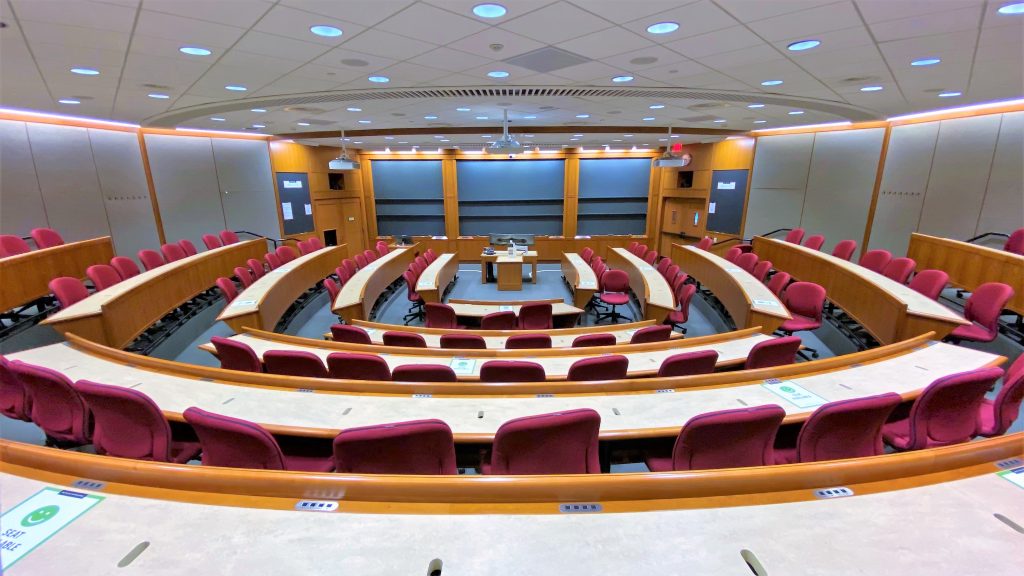
- Course format
HBS uses the case method, which means that every class is taught using a case study of a company. The Professor only serves as a facilitator, directing the conversation but not asserting any opinions. It is the responsibility of each student to analyze the case and share their opinions, even if they have no prior experience in the field. This is where we each get to draw on our uniqueness – whether that’s where we’re from, the places we’ve worked, or the subjects we are passionate about.
Due to this emphasis on the case method, participation in class by students is mandatory. This is where the dreaded “cold call” comes into play – Professors can call on any student to comment on a case during a class, and they must have something to share. One thing I’ve learnt here is to not be afraid to share my thoughts, even if they are “half-baked”, seemingly contradictory or not entirely correct, as long as I am respectful and open to other perspectives.
Class participation often makes up half of the grade for each course, while the final exam makes up the other half. Some courses may also have midterms or other exercises make up a small part of the grade.
- Course structure
In the first year, I took 10 required courses (5 per semester). The first year is designed to arm students with the fundamental topics they should understand as a business leader. In the winter of the first year, between the first and second semesters, the school offers optional Short Intensive Programs (SIPs). Just like they sound, they are week-long programs that cover a wide range of topics. Students usually get to pick one along their interests to attend. This year, one of my favorite people, Bozoma Saint John, hosted one.
Although my class did not get to experience this, the first year usually ends with the “FIELD Immersion”, a course that involves working directly with companies to help them solve identified business problems and has had previous students travel all over the world to do so. The aim is to put into practice what they have learnt through the first year.
By the second year, students then have the freedom to choose what they learn. We get a whole catalog of courses to choose from, and can even cross-register for courses in other schools (e.g. other Harvard schools or MIT), take some courses where we get to travel, or for the entrepreneurially minded, take courses that allow them to work on their startups. You can find more details on first- and second-year courses on the school website.
HBS also recently introduced the Data Science track, which allows international students (like me) select courses that will help us qualify for STEM extension (if approved, we can work in the US for up to 3 years after graduation, rather than the traditional 1 year).
- Resources
One of the most remarkable things about top tier schools like HBS is the wealth of resources you get access to, especially if you are coming from a public-school education system like I am, where these things are simply not available.
On the academic front, we had access to tutors for each course we took in the first year. So, whenever I found myself needing some extra help on certain topics, I simply booked a private tutoring session for free. Through the Student Academic Services (SAS), we have access to writing coaches to help us learn how to write business case exams (yes, there’s a method to this thing). They also offer reading coaches, in case we need help with effective case reading strategies or class participation guidance. Each course also usually has a Teaching Assistant (TA), typically Doctoral students that offer review sessions to explain concepts covered in class or help prepare for midterms and finals. If we want to talk to Professors directly, we do so through one-on-one office hours or group coffee chats.
In addition to making tutoring available, HBS assigns students into discussion groups with 5 or 6 other students from different sections, and the expectation is that we discuss the cases before class, and hopefully gain a fresh perspective or some clarity before meeting with our sections and Professor. There’s a strong emphasis on academic integrity though, so we’re always expected to go into discussions well prepared, and not copy or parrot what other students have come up with on their own.
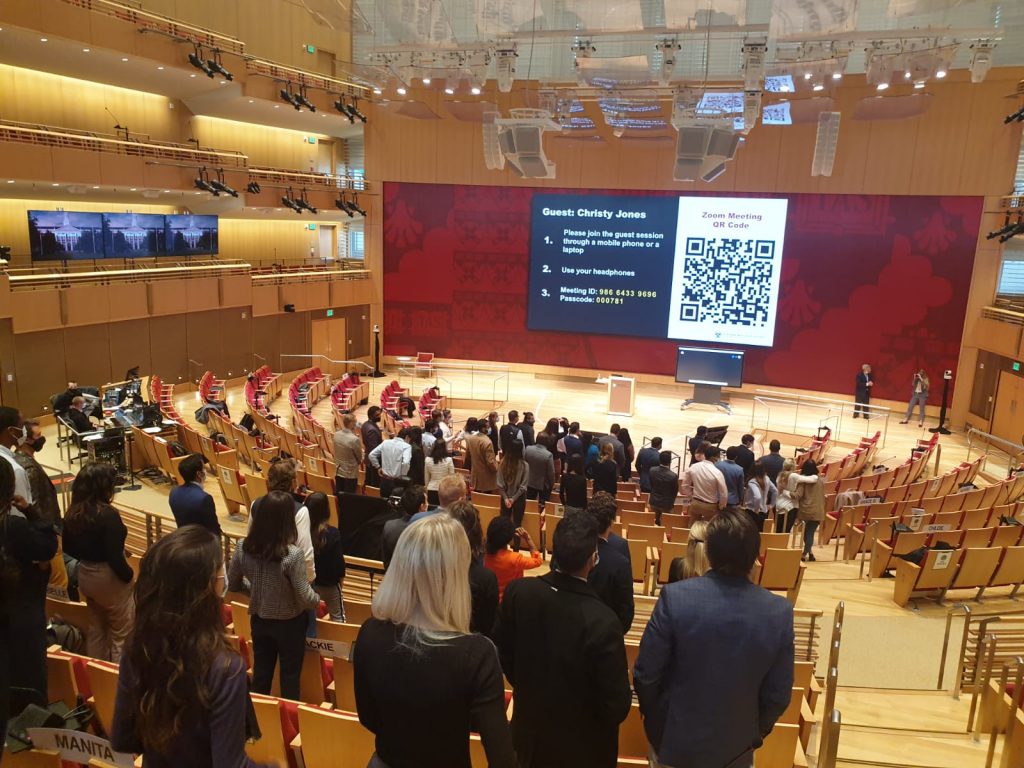
Careers
Outside of students who were sponsored by their companies or who somehow already secured job offers before starting school, careers is often the highest priority for most students. As you can probably imagine, recruiting can be a grueling and time-consuming experience.
- Recruiting process
There are two major recruitment streams – summer internship recruitment (which happens in the first year) and full-time recruitment (which happens in the second year). The summer internship recruitment is particularly important because in many cases, it leads to full time offers, which means students who get good internship offers can save themselves the stress of recruiting in the second year.
Recruiting season starts from October of the first year. There is usually a 1.5-month moratorium period after START, during which no recruiters are allowed to reach out to students. Once it is lifted in early October, companies start reaching out to organize recruiting events such as information sessions, coffee chats, and to connect prospective applicants to current employees.
I like to categorize the recruiting experience in 2 ways, broadly speaking – recruiting for a traditional MBA industry (such as consulting and investment banking) and recruiting for a non-traditional MBA industry (pretty much every other sector). For those recruiting for a traditional industry, the process typically progresses in the same way every year: applications close in November or December, interviews happen in January and offers go out shortly afterwards. Networking and attendance at recruiting events is expected of any serious candidate. For those targeting the non-traditional industries, timelines will vary depending on the specific company, and much of the outreach will have to be driven by the student.
- Recruiting as an international student
In addition to the regular recruiting struggles, there are a few more hurdles we have to jump through as international students, if we want to work in the US. To start with, not every company recruits internationals. The major reason is that they don’t want to go through the hassle of having to figure out work authorization at some point in the future. That said, there are a lot of companies who do hire internationals, and most of the biggest companies do.
- Entrepreneurship
For students planning to launch their own company, their journey naturally looks very different from that of those looking to join companies. Aspiring founders typically spend the summer working on their startups while others head to their internships. There are a number of ways in which HBS supports entrepreneurship-oriented students. One of them is through a SIP called Startup Bootcamp, a 2-week program where students form startup teams and test their ideas while hearing from successful founders. There are also several venture contests where founders win funding for their startups, and the Rock Summer fellowship, which provides substantial financial support and community to startup founders and joiners.
- Resources
The Career and Professional Development (CPD) department oversees all career-related activities. They manage many of the resources HBS provide students throughout the various phases of our career journeys:
- Resume and LinkedIn optimization
One of the first career resources we got access to is the HBS resume template, which helps us present our experiences in a format familiar to companies that recruit at HBS. Once I had my first draft, I ran my resume through VMock, a platform that uses artificial intelligence (AI) to help fine-tune it. After attaining a satisfactory score there, I then sent it along to CPD to have it reviewed by a career coach before it is shared with recruiters. We can do this as many times as we need to. VMock also helps review and streamline our LinkedIn profiles, if desired.
- Careers Portal
A careers portal called 12Twenty is our central tool for managing careers. Through this portal, we get access to a host of things, including:
- Job postings for both summer internships and full-time jobs. Our resumes are hosted as part of a “resume book” on this site so we can apply for most jobs with a single click on the site
- Employer details, including previous years’ openings and key contacts. This is often useful for people trying to recruit for a role that does not have a current opening in job postings
- Recruiting events by various employers and CPD
- Job research, showing general information on past employment outcomes, salaries, etc. for various industries, roles or employers
- Career coach appointments
- Student profiles showing our experiences and interests, which recruiters can use to find potential candidates
- Career coaches
CPD also provides career coaches with all sorts of backgrounds and specializations to help students through pretty much every stage of the career journey – from students who are still trying to figure out what to recruit for, to those who already know but need help formulating a networking plan, preparing for interviews or evaluating offers from different companies. It personally took a bit of “shopping around” to find coaches who matched my needs, but it has been worth it.
- CPD website and events
CPD hosts a bunch of events throughout the school year. I attended a number ranging from career-vision crafting sessions to industry chats with alumni, recruiting skills workshops with experts and international student-specific recruiting webinars. All of these are accessible through 12Twenty. They also have a website where they share all kinds of resources including networking email templates, cover letter examples, sample interview questions and videos with recruiting tips for various stages. In addition, they have a blog where they share career tips and articles.
- Learning and Research
The Business School’s library – Baker Library – is a great resource for students doing research. Through HBS, we get access to A LOT of databases such as the Wall Street Journal, Financial Times, Capital IQ, Pitch book, amongst so many others. I have personally found them incredibly useful while doing some research at my summer internship. Many people also use them to do industry/company research in preparation for job interviews or networking calls. In addition, students looking to do research but who do not know where to start can send an email to the Library team outlining their goals and they would send links to resources to help kick things off.
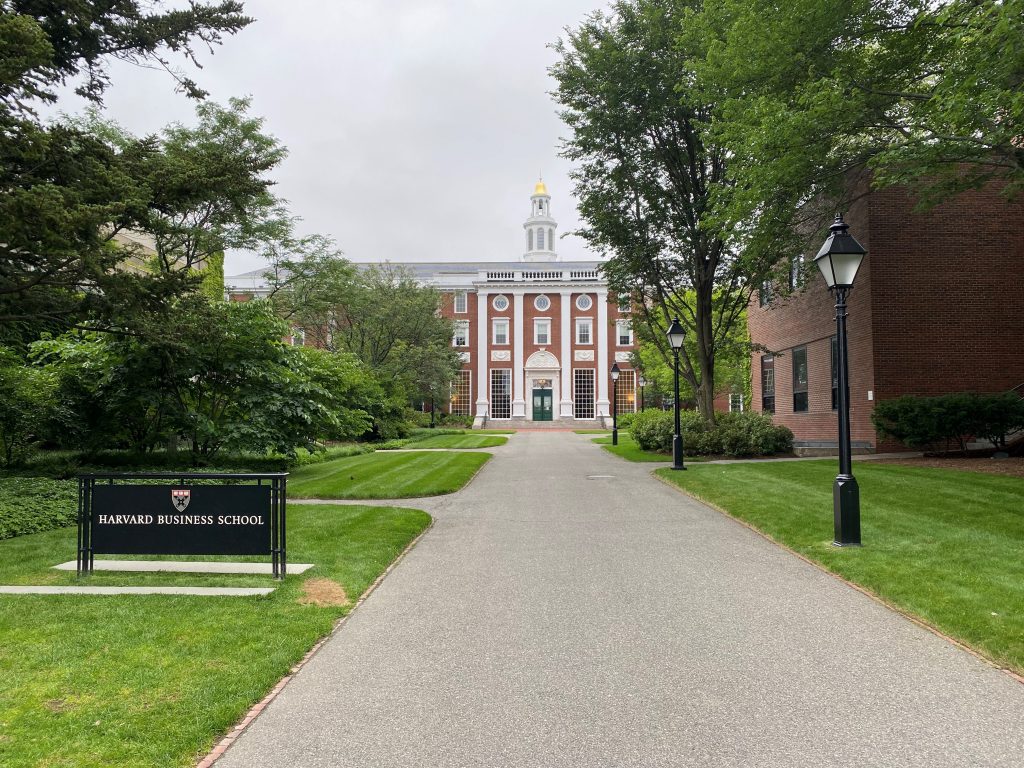
We also get access to a few skill building services. Those I have personally made use of are Wall Street Prep and LinkedIn Learning.
- Alumni Portal
Alumni are another great resource for job search. HBS has a truly diverse alumni pool in various sectors all over the world. They can be immensely helpful in connecting students to job opportunities, and we are able to contact them through a portal that contains information about everyone who studied at HBS. I for one have spoken with a number of alumni in some of my target companies.
Student life
Business school is just as much about what happens outside the classroom as it is about what happens inside of it. Although my class missed out on a lot of this side of school thanks to COVID, we still got to experience a few good things:
- Events
I unfortunately do not have a lot to say here since COVID restricted social activity for my year, but there is usually a very active social scene. In addition to planned school-wide events, various sections and affinity groups often host social events. In a normal year, we would have had several balls, cross-school sporting events, retreats and theater shows. A few events were thankfully converted to a virtual format, allowing me to participate from across the ocean before I got my visa and moved to Boston.
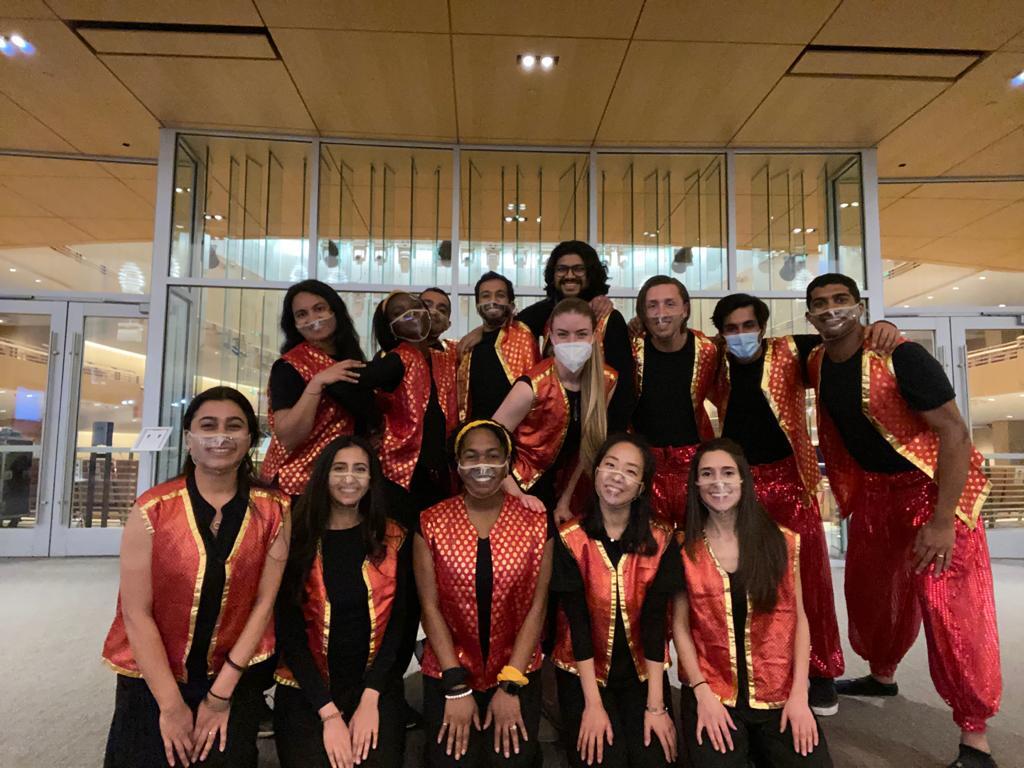
We also had cultural events such as Flag Day and International Food Festival – which help students learn about and appreciate other cultures around the world – and events focused on Diversity and Inclusion. One event I found very interesting was one called “Orientation in the Dark”, which I attended at the beginning of the school year. It was hosted entirely blind, which meant we could not see any of the participants’ faces or names and was aimed at helping people connect deeply and authentically by eliminating the assumptions triggered by visual cues.
In addition, students also organize treks, which are trips to countries or cities around the world, hosted by people from those places. As you can imagine, that did not really happen for us due to the travel bans, but there a quite a few coming up starting from this summer, so I’m super excited!
- Community building
At HBS, there are a number of activities that encourage community building and bonding. My-takes are one such tradition. They are events where one member of the HBS community shares their life story either to a school-wide audience (community my-takes) or to their section (section my-takes). They offer a great way to get to know people on a deeper level and make connections. Taking it one level further, we have Evolve groups, which are small groups where students can dive even deeper and share things about their lives that they may not be comfortable sharing in public. It is predicated on trust and fosters very close friendships for people in the same group.
- Clubs
There are three broad categories of clubs – social clubs, affinity groups and career clubs. Social clubs are clubs organized around various hobbies and are usually just for fun. As a dance lover, I was part of the HBS Show (a musical theater club) and Beyond Dance clubs. Affinity groups are clubs you belong to because they represent a part of your identity. These include clubs like the African American Students Union (AASU), Pride and the Africa Business Club (ABC). The career-based clubs support career interests for different industries and are a great help for students recruiting in those industries. Usually, people find themselves in at least one club in each of those three categories.
Each club hosts a variety of activities depending on their purpose, including some very well-known events such as the annual ABC Conference (shameless plug 😊). Clubs are also often a great way to meet people outside of your section.
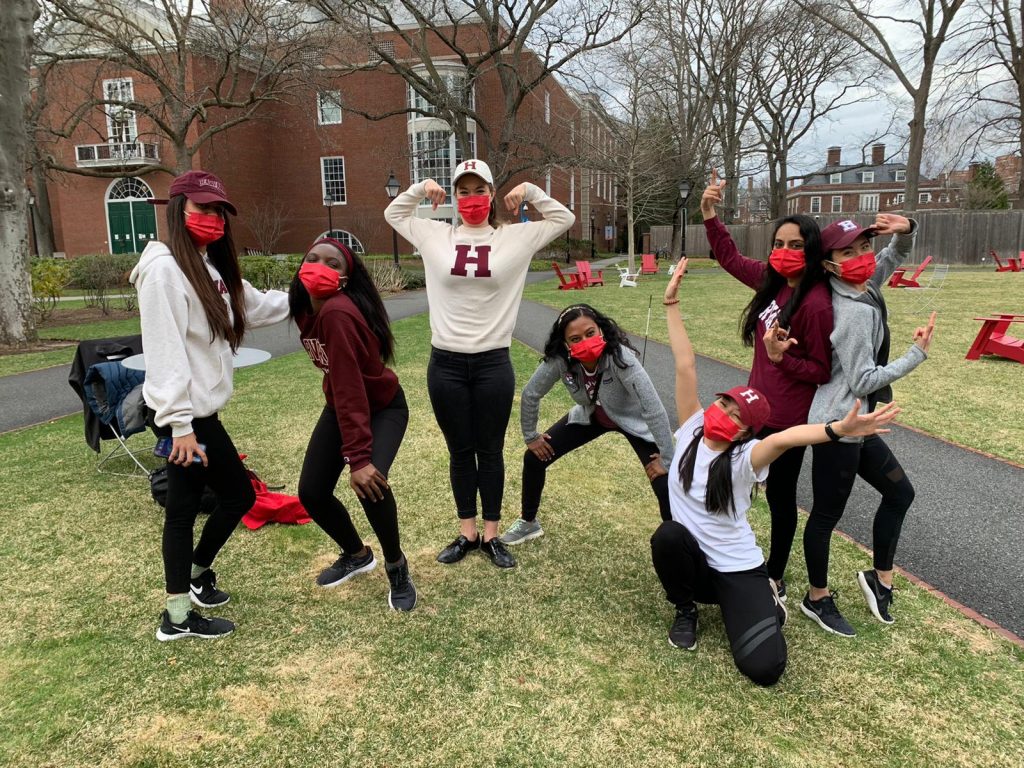
- Student leadership
There are many leadership opportunities for those interested. We have leaders at the section level, the club level, and the Student Association (SA) level, and students are free to pursue as many as they feel they can handle. I personally hold 3 positions – Treasurer for my Section, Admissions representative for ABC and Chief Financial Officer for the SA.
Whew! That was a lot! This doesn’t cover everything about the HBS experience, but I hope it gives an idea of what it looks like. If you are considering applying and don’t know where to start, check out my Business School Application series. If you are already applying, know that I’m rooting for you!
Let me know what you think in the comments, or email me at hello@chiamakaokoye.com!
Editor’s Note: Chiamaka first published this on her blog
Established in March 2013, JarusHub is a Nigerian information hub with focus on career and management. It is rated Nigeria's most authoritative destination for online career resources. It parades an array of Nigerian professionals who share their career experiences with a view to bridging career information gap and mentoring a generation to success. Whether you're a student, a recent graduate or an established professional, or even an executive, you will always find something to learn on JarusHub. All enquiries to jarushub@gmail.com or 0808 540 4500. Facebook: www.facebook.com/jarushub; Twitter: @jarushub or @mcjarus.
The Best Countries in Africa to Live and Work In
September 15, 2021My experience with job by connection and lessons therein
August 24, 2021
1 comment
Let us have your say by leaving a comment belowCancel reply
Recommended For You
-
HOW TO BE SUCCESSFUL IN ANYTHING
May 10, 2015 -
YSR: Google 2013 Trends – Behind the statistics (Nigeria)
January 2, 2014





Thank You from Time of Usa for providing such a beautiful piece of information